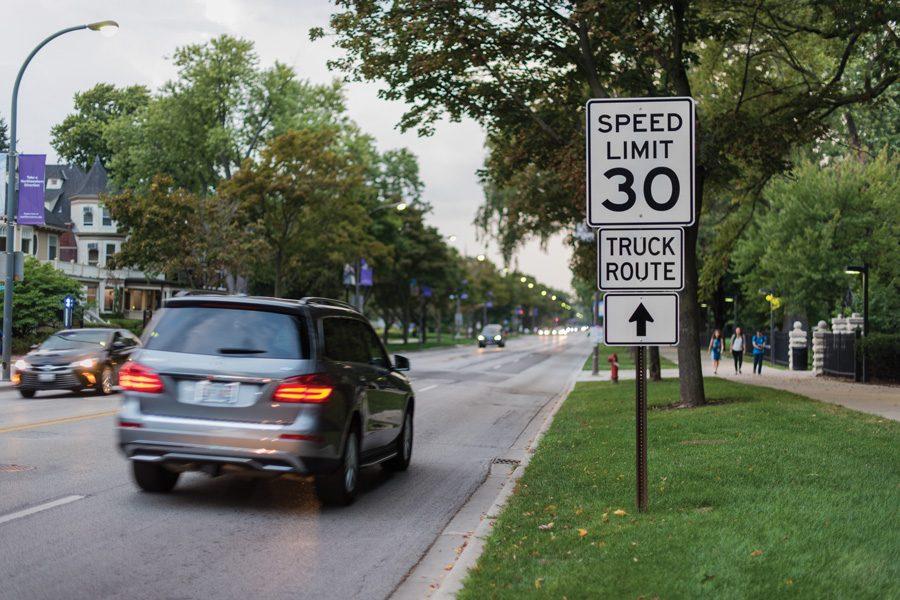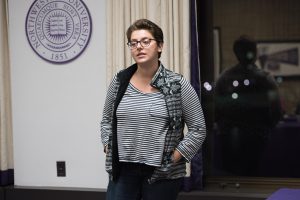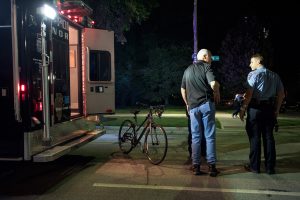Bike lane plans approved two years ago receive new scrutiny
Noah Frick-Alofs/The Daily Northwestern
The current speed limit on Sheridan Road through campus is 30 miles per hour. Discussion about plans for bike lanes on the road is set to continue at tomorrow’s council meeting.
October 16, 2016
Although city manager Wally Bobkiewicz said plans for bike lanes on Sheridan Road are “largely set in stone,” conversation among students, residents and city official will likely be rekindled at a council meeting tomorrow.
Ald. Judy Fiske (1st) is encouraging students to attend Monday’s City Council meeting, at which plans for the lane construction will be presented. The push for bike lanes, which are set to be constructed next summer, was renewed after the death of freshman Chuyuan “Chu” Qiu, who was killed in September while turning onto Sheridan Road on her bike.
The plans for the bike lanes were finalized by a council vote in 2014, Bobkiewicz said. However, small tweaks could be made to the plans before construction, he said.
In an interview with The Daily last week, University President Morton Schapiro urged close consideration of bike lanes construction.
“The idea that all bike lanes somehow make everything safe is just not right … It depends on where you put the bike lanes,” he said. “We want to make sure that they get it right.”
Schapiro said Qiu’s death was an “unthinkable tragedy” and that he keeps a photo of the first-year student on his desk.
“If we don’t have the right kind of bike lanes, it’s not going to address anything — in fact, it can exacerbate things,” he said. “So if we’re going to do this, we’d better know what we’re doing.”
Under the current design, the bike lanes will extend from the intersection of Sheridan Road and Chicago Avenue and extend north to Lincoln Street on the east side of the road. There will be two lanes of traffic going either direction from Chicago Avenue to Northwestern Place, and one lane north of there to Central Street.
Fiske and Ald. Eleanor Revelle (7th) — whose wards both include parts of Sheridan Road — have asked the council to consider lowering the speed limit to 25 mph. The current limit is 30 mph.
Both Schapiro and Fiske support lowering the speed limit. Aldermen would have to pass an ordinance to lower the limit.
Communication senior Emily Blim, who started a petition following Qiu’s death urging aldermen to lower the speed limit on Sheridan Road, said she currently avoids biking on the road.
Blim, who has been an avid cyclist since her first year of college, said although bike lanes can make things easier for people trying to get from one point to another as quickly as possible, they can be intimidating for some cyclists.
“It’s dangerous for inexperienced bikers because it gives this sense of security that is not necessarily there,” she said.
Although the plans for construction have already been approved, Fiske said she feels better they are again being discussed. She added that she voted against the bike lane plan and has always felt one lane in both directions would be safer.
Although slowed traffic with one lane in either direction may be frustrating, Fiske said slower traffic would create a safer situation for cyclists. There are a lot of “potential conflicts” on Sheridan Road, Fiske said, and the road seems to have become more heavily used in the last five or so years.
“People who are the least protected are first pedestrians and secondly bicyclists,” she said.
Fiske said it is essential for students to become involved in the discussion, despite the fact the plans are already approved.
“Really this is designed for Northwestern students,” she said. “We need everyone to be involved with this.”
SESP sophomore Ben Powell, who is an Associated Student Government senator for five social justice groups, said he appreciates the effort to involve students in the discussion.
Powell introduced an amendment at ASG on Wednesday asking the city to consider permanently closing Sheridan Road to through traffic. Powell said he didn’t introduce the amendment to stop car traffic on that road immediately, but to get people thinking about how the road could be differently used.
“It’s easy to stick with the perception that a road is just a road for cars,” he said. “A road is a public space, and both students and residents of Evanston should be able to use it as a public space and really think through whether it’s being used to serve that end.”
Powell said he thinks the bike lanes are a good step and that the road as it’s currently designed is “dominated” by cars.
“We should always be looking at whether what we have is actually serving our needs,” Powell said.
Email: [email protected]
Twitter: @noracshelly





